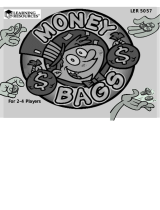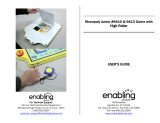
However, the owner may sell this mortgaged property to another
player at any agreed price. If you are the new owner, you may lift the
mortgage at once if you wish by paying off the mortgage plus 10%
interest to the Bank. If the mortgage is not lifted at once, you must pay
the Bank 10% interest when you buy the property and if you lift the
mortgage later you must pay the Bank an additional 10% interest as
well as the amount of the mortgage.
BANKRUPTCY…You are declared bankrupt if you owe more than
you can pay either to another player or to the Bank. If your debt is to
another player, you must turn over to that player all that you have of
value and retire from the game. In making this settlement, if you own
houses or hotels, you must return these to the Bank in exchange for
money to the extent of one-half the amount paid for them; this cash is
given to the creditor. If you have mortgaged property you also turn
this property over to your creditor but the new owner must at once
pay the Bank the amount of interest on the loan, which is 10% of the
value of the property. The new owner who does this may then, at
his/her option, pay the principal or hold the property until some later
turn, then lift the mortgage. If he/she holds property in this way until
a later turn, he/she must pay the interest again upon lifting the
mortgage.
Should you owe the Bank, instead of another player, more than you
can pay (because of taxes or penalties) even by selling off buildings
and mortgaging property, you must turn over all assets to the Bank. In
this case, the Bank immediately sells by auction all property so taken,
except buildings. A bankrupt player must immediately retire from the
game. The last player left in the game wins.
MISCELLANEOUS…Money can be loaned to a player only by the
Bank and then only by mortgaging property. No player may borrow
from or lend money to another player.
RULES for a SHORT GAME (60 to 90 minutes)
There are five changed rules for this first Short Game.
1. During PREPARATION, the Banker shuffles then deals three Title
Deed cards to each player. These are free—no payment to the Bank
is required.
2. You need only three houses (instead of four) on each lot of a
complete color-group before you may buy a hotel. Hotel rent remains
the same. The turn-in value is still one-half the purchase price, which
in this game is one house less than in the regular game.
3. If you land in Jail you must exit on your next turn by 1) using a
“Get Out of Jail Free” card if you have (or can buy) one; or 2) rolling
doubles; or 3) paying $50. Unlike the standard rules, you may try to
roll doubles and, failing to do so, pay the $50 on the same turn.
4. The penalty for landing on “Income Tax” is a flat $200.
5. END OF GAME: The game ends when one player goes bankrupt.
The remaining players value their property: (1) cash on hand; (2) lots,
utilities and railroads owned, at the price printed on the board; (3) any
mortgaged property owned, at one-half the price printed on the board;
(4) houses, valued at purchase price; (5) hotels, valued at purchase
price including the value of the three houses turned in.












